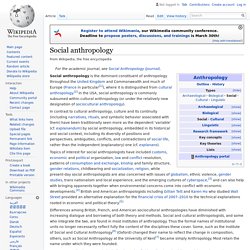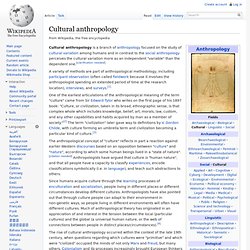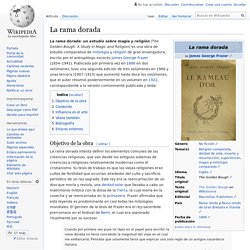

Claude Lévi-Strauss : l’ethnocentrisme, entre humanité et barbarie, ou le paradoxe du relativisme culturel. Social anthropology. Social anthropology is the dominant constituent of anthropology throughout the United Kingdom and Commonwealth and much of Europe (France in particular[1]), where it is distinguished from cultural anthropology.[2] In the USA, social anthropology is commonly subsumed within cultural anthropology (or under the relatively new designation of sociocultural anthropology).

In contrast to cultural anthropology, culture and its continuity (including narratives, rituals, and symbolic behavior associated with them) have been traditionally seen more as the dependent 'variable' (cf. explanandum) by social anthropology, embedded in its historical and social context, including its diversity of positions and perspectives, ambiguities, conflicts, and contradictions of social life, rather than the independent (explanatory) one (cf. explanans). Differences among British, French, and American sociocultural anthropologies have diminished with increasing dialogue and borrowing of both theory and methods.
A. Cultural anthropology. Cultural anthropology is a branch of anthropology focused on the study of cultural variation among humans and in contrast to the social anthropology perceives the cultural variation more as an independent "variable" than the dependent one.

[clarification needed] A variety of methods are part of anthropological methodology, including participant observation (often called fieldwork because it involves the anthropologist spending an extended period of time at the research location), interviews, and surveys.[1] One of the earliest articulations of the anthropological meaning of the term "culture" came from Sir Edward Tylor who writes on the first page of his 1897 book: "Culture, or civilization, taken in its broad, ethnographic sense, is that complex whole which includes knowledge, belief, art, morals, law, custom, and any other capabilities and habits acquired by man as a member of society. "[2] The term "civilization" later gave way to definitions by V. Theoretical foundations[edit]
Clifford Geertz. Vida[editar] Después de servir en la Marina de los Estados Unidos durante la Segunda Guerra Mundial (1943-45), Geertz estudió en el Antioch College, donde se licenció en 1950; más tarde se doctoró en Harvard como doctor en Filosofía en 1956.

Pasó por varias escuelas antes de formar parte del equipo de antropólogos de la Universidad de Chicago (1960-70); posteriormente se convirtió en profesor de ciencias sociales del Institute for Advanced Study en Princeton en New York de 1970-2000, donde fue emérito hasta su muerte, el 30 de octubre de 2006. Recibió un doctorado honorífico del Bates College en 1980. Pensamiento y obra[editar]
Structuro-fonctionnalisme. Fonctionnalisme. Évolutionisme. Structuralisme. Cultura Segunda Parte - Profesor Horacio Sampayo Facultad de Ambiente UNComa. Cultura primera parte. La rama dorada. La rama dorada: un estudio sobre magia y religión (The Golden Bough: A Study in Magic and Religion) es una obra de estudio comparativo de mitología y religión de gran envergadura, escrita por el antropólogo escocés James George Frazer (1854–1941).

Publicada por primera vez en 1890 en dos volúmenes, tuvo una segunda edición de tres volúmenes en 1900 y unas tercera (1907–1915) que aumentó hasta doce los volúmenes, que el autor resumió posteriormente en un volumen en 1922, correspondiente a la versión comúnmente publicada y leída. Objetivo de la obra[editar] La rama dorada intenta definir los elementos comunes de las creencias religiosas, que van desde los antiguos sistemas de creencias a religiones relativamente modernas como el cristianismo.
Su tesis de trabajo es que las viejas religiones eran cultos de fertilidad que ocurrían alrededor del culto y sacrificio periódico de un rey sagrado. Contenido[editar]